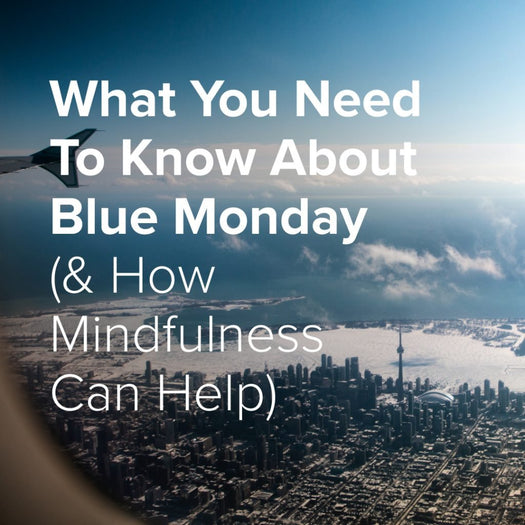What You Need To Know About Blue Monday (& How Mindfulness Can Help)

A few weeks into the new year, you might be missing the holiday sparkle, money might feel a bit tighter after paying bills and splurging on gifts, and you might be starting to fall off your resolution wagon. And with many of us back to work after a long holiday break, it’s no wonder some people feel a bit more down than usual in January. In fact, these sluggish feelings in the first month of the year were apparently so common that a term emerged for the third Monday of January: Blue Monday.
What is ‘Blue Monday’?
So where did the term ‘Blue Monday’ come from? It dates back to 2005 when the now-defunct UK TV channel Sky Travel sent a press release to journalists saying they had calculated the most miserable day of the year.

Why were they excited about this? Sky Travel, in an effort to boost airline ticket sales, had teamed up with psychologist Cliff Arnall and asked him to figure out the best day to book a holiday trip. Arnall deduced that people were most likely to book a vacation when they were feeling crummy, so he devised a formula to support this theory, and—voila!—‘Blue Monday’ was born (1). Here’s what his formula looked like:
[W + (D-d)] x TQ
M x NA
The seven variables represent (W) weather, (D) debt, (d) monthly salary, (T) time since Christmas, (Q) time since failed quit attempt, (M) low motivational levels, and (NA) the need to take action (4).
Blue Monday Around the World
Adding to the Monday phenomenon, a few years later research came out in Japan that revealed the suicide rate for those of “productive age” was significantly higher on Mondays than any other day of the week (1). Despite this research and Arnall’s scientific-looking formula, it still hasn’t been proven that any one day is notably more depressing than any other.
Where Blue Monday Breaks Down
After looking at Arnall’s formula, many quickly claimed his theory was pseudoscience—fake science made up for a marketing ploy (which it was). And when you look at the variables—from weather to monthly income—you can see that they can’t be measured or compared in the same units. And how does one measure “the need to take action”? Other critics of the day have gone so far as to say that it does a disservice to mental health by trivializing it down to one bad day (3).

Cliff’s controversial research aside, there is a form of depression that many of us face as winter days get colder, and shorter, and darker: Seasonal Affective Disorder (SAD).
The shorter days and less sunlight of winter can lead to a biochemical imbalance in the brain.
And as the seasons change, you might also experience a shift in your circadian rhythm (your biological clock) that can leave you feeling out of whack with your regular schedule (1).
According to Psychology Today, an estimated 10 million Americans are affected by SAD. Some common symptoms you might feel are fatigue and sleepiness, as well as the desire to overeat and withdraw socially when the winter months roll around (8). A closer look at what’s happening in the brain can help us understand why SAD happens and what we can about it.
Seasonal Affective Disorder & the Brain
Research suggests that when you’re experiencing SAD, you may have less activity from the brain chemical serotonin, which is key to regulating your mood (8). Research also suggests that sunlight can affect the molecules that help maintain your normal serotonin levels.
Studies show that serotonin regulation doesn’t work properly for people with SAD, resulting in less serotonin in the brain (8). Other findings suggest that people with SAD produce too much melatonin—the hormone that’s key to helping us fall asleep and our circadian rhythm (8).

These serotonin and melatonin shifts can throw your whole system out of whack and make it harder to adjust when the days get shorter, leading to more disruptive sleep, changes in mood, and you not feeling like yourself (8).
Light Therapy & the Brain
Neuroscience research suggests adding more light to your day, particularly in the morning, to help lessen the symptoms of SAD. In one study of light therapy, patients who received daily bright light treatment for three weeks showed significantly lower depressive symptoms than those who hadn’t (5).
Vitamin D & the Brain
If you’re deficient in vitamin D, it can make matters worse since the vitamin is believed to promote serotonin activity. So how can we keep our mood up when the chill sets in? Adding more vitamin D to your diet—whether from foods like fish and mushrooms or via supplement—has also been shown to help bump up your body’s serotonin activity (6).
How Mindfulness Can Help Combat the Winter Blues
You’ve likely heard of mindfulness if not tried it yourself. But what exactly is mindfulness and how can it help with SAD and the winter doldrums? Simply, mindfulness is about being present with your thoughts and feelings at the moment without judgment. In this way, it can help change your response to negative thinking. One study found that mindfulness-based cognitive therapy—which includes mindfulness meditation—helped prevent the recurrence of depression as effectively as antidepressants (7).
Further, researchers have reviewed over 200 studies on mindfulness among healthy people and found mindfulness-based therapy to be effective in reducing stress, anxiety, and depression (9).

In practice, mindfulness meditation involves two simple steps: attention and awareness. Attention is about tuning in to what’s happening in the present moment. Focusing on your breath or the physical sensations your feeling in your body are common tools to help you tune in.
Acceptance means observing those feelings and sensations without judgment. So instead of responding to that anxious thought or getting fidgety and adjusting your clothing, the aim is to note the experience (“anxiety” or “fidgets”) and let them pass.
Join the Muse Mindfulness Challenge!
If you’re new to mindfulness or wanting to revisit the basics, we’re hosting a free 7-day Mindfulness Challenge on January 20-26. Our world-renowned experts will guide you step-by-step.
Mindfulness, vitamin D, and some extra light can go a long way toward helping us get through winter and the new year with more clarity, ease, and optimism. And regardless of whether Blue Monday holds any merit or not, we can use the day as a reminder to check in on our well-being as well as encourage more conversation around our mental health.
Note: This article is not meant to serve as medical advice and you should consult your healthcare provider or a mental health specialist about any concerns and to determine what’s best for you.
Resources:
- Rogers, Kristen and Picheta, Rob. 2020, January 20. Today’s ‘Blue Monday’ depression peak isn’t real, but seasonal blues are. Here’s what to do about them. CNN. https://www.cnn.com/2020/01/20/health/blue-monday-debunked-wellness-scli-gbr-intl/index.html
- Sime, Carley. 2019, January 21. Blue Monday Isn’t Real So Why Still Talk About It? Forbes. (Blog post). https://www.forbes.com/sites/carleysime/2019/01/21/blue-monday-isnt-real-so-why-still-talk-about-it/?sh=6166c49f7d5d
- Togoh, Isabel. 2020, January 20. Here’s Why ‘Blue Monday’ Should Be Approached With Caution. (Blog post). https://www.forbes.com/sites/isabeltogoh/2020/01/20/heres-why-blue-monday-should-be-approached-with-caution/?sh=5876f1571e20
- Carlile, Jennifer. 2005, January 21. Jan. 24 called the worst day of the year. NBC News. https://www.nbcnews.com/id/wbna6847012#.Xh3SVchKiUk
- 2006, June 26. Bright Lights, Big Relief. American Psychological Association. https://www.apa.org/research/action/light
- Jones, Taylor. 2019, December 18. 7 Healthy Foods That Are High In Vitamin D. (Blog post). Healthline. https://www.healthline.com/nutrition/9-foods-high-in-vitamin-d
- Lu, Stacy. 2015 March. Mindfulness holds promise for treating depression. American Psychological Association. https://www.apa.org/monitor/2015/03/cover-mindfulness
- Seasonal Affective Disorder. National Institute of Health. https://www.nimh.nih.gov/health/publications/seasonal-affective-disorder/index.shtml
- 2019, October 30. Mindfulness meditation: A research-proven way to reduce stress. American Psychological Association. https://bit.ly/3i8qKfB

